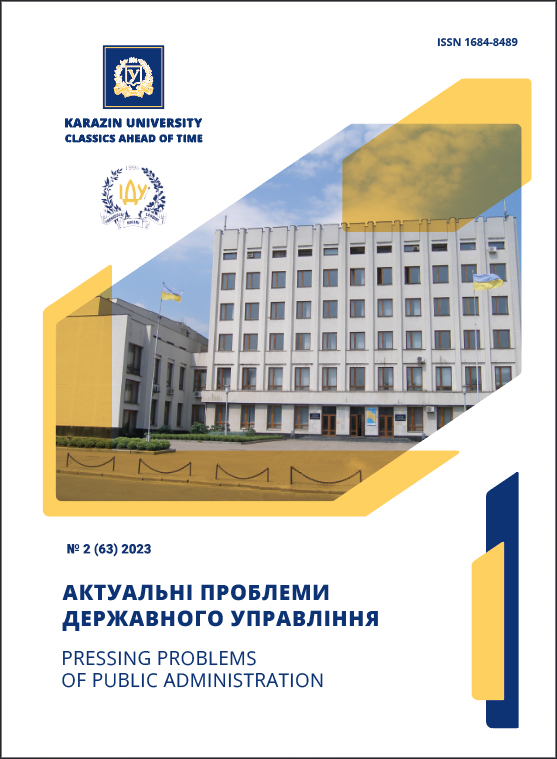Digital Nomads: Global Tourists or New Workers for Post-War Economic Recovery of Ukraine?
Abstract
The paper offers the authors’ perspective on the new global problem of digital nomads as a potential resource and as a socio-economic problem of post-war Ukraine. The purpose of the article is to determine the contours of the future state migration and internal economic policy of post-war Ukraine for the culturally and politically successful attraction of digital nomads to Ukraine. The first half of the article offers a comprehensive theoretical overview of the essence and structural morphology and models of the modern concept of “digital nomad”, referring to authoritative Western literature. The second half of the article offers its own synthesis and induction of the conditions, factors and consequences of the involvement of digital nomads in post-war Ukraine, abstracting from other factors that will be the trigger and macro signal for digital migration to Ukraine. The pper concludes that, taking into account the high level of competition for talented digital nomads, the state policy of Ukraine should emphasize unique advantages - high qualification of IT specialists, a favorable tax regime, permission for settlements secured by tokenized assets, conditions for easy realization of investment opportunities in post-war economy, which will 100% need creative solutions and startups. The basis for the successful involvement of digital nomads should be the coordinated work of various branches of government: from changes in legislation and digitalization of public services to effective international marketing of new conditions and opportunities, as well as ensuring the appropriate level of security and basic household amenities in selected hubs
Downloads
References
Dychkovskyi, S.I. (2021). Global transformations of tourist practices and technologies in the context of the emergence of the digital society. Doctoral dissertation. Kyiv. URL: http://surl.li/nqwzu [in Ukrainian].
Dunayev, I. & Kovalenko, M. (2022). New traces of regulating information platforms and platform economy for the public good. Pressing problems of public administration, no. 2 (61), 6–24. DOI: https://doi.org/10.26565/1684-8489-2022-2-01 [in Ukrainian].
Kovalenko, M. M. & Dunayev, I. V. (2023). Components of public policy in the implementation of the mobilization model of economic development. Theory and practice of public administration, no. 1 (76), 7–25. URL: https://periodicals.karazin.ua/tpdu/article/view/22287/20607
DOI: https://doi.org/10.26565/1727-6667-2023-1-01 [in Ukrainian].
Ovchinnikova, O. V. (2016). Precarious forms of employment: essence and manifestations. Ukranian society, no. 1 (56), 54–64. DOI: https://doi.org/10.15407/socium2016.01.054 [in Ukrainian].
Fedoriv, P. (n.d.). What is gentrification and does it exist in Ukraine? URL: https://mistosite.org.ua/uk/articles/shcho-take-dzhentryfikatsiia-i-chy-ie-vona-v-ukraini [in Ukrainian].
Bazylevych, V., Osetsky, V. & Tatomur, I. (2019). Conformity of higher education with requirements of “digital natives”. Bulletin of Taras Shevchenko National University of Kyiv: Economics, no. 1 (202), 6–13. URL: http://bulletin-econom.univ.kiev.ua/wp-content/uploads/2019/06/202-6-13.pdf [in Ukrainian].
Bruns, L. (2023). Meet the digital nomad week speakers: Lily Bruns, Draper startup house. URL: https://total-croatia-news.com/news/digital-nomads-in-croatia/lily-bruns/
Cook, D. (2022). Breaking the contract: Digital nomads and the state. Critique of Anthropology, no. 42 (3), 304–323. DOI: https://doi.org/10.1177/0308275X221120172
Cook, D. (2020). The freedom trap: Digital nomads and the use of disciplining practices to manage work/leisure boundaries. Information Technology & Tourism, no. 22, 355–390.
DOI: https://doi.org/10.1007/s40558-020-00172-4
Cook, D. (2023). What is a digital nomad? Definition and taxonomy in the era of mainstream remote work. World Leisure Journal, no. 65 (2), 256–275. DOI: https://doi.org/10.1080/16078055.2023.2190608
Cook D. (2020). Remote-work visas will shape the future of work, travel and citizenship. The Conversation, 3 September, 2020. URL: https://theconversation.com/remote-work-visas-willshape-the-future-of-work-travel-and-citizenship-145078
Dunayev, I., Byelova, L., Kud, A., & Rodchenko, V. (2023). Implementing the “government as a platform” concept: the assessment method and an optimal human-centered structure to address technological challenge. Eastern-European Journal of Enterprise Technologies, no. 2 (13 (122)), 6–16. URL: http://journals.uran.ua/eejet/article/view/275613 DOI: https://doi.org/10.15587/1729-4061.2023.275613
Dunayev I., Kuchma M., Byelova L., Jatkiewicz P., Bilichenko O., Poberezhets H. Wartime destruction: regional assessment of damage to Ukraine’s infrastructure. International Journal of Environmental Studies. 2024. URL: https://www.tandfonline.com/doi/full/10.1080/00207233.2024.2314862?scroll=top&needAccess=true DOI: https://doi.org/10.1080/00207233.2024.2314862
Hannonen, O. (2020). In search of a digital nomad: Defining the phenomenon. Information Technology & Tourism, no. 22 (3), 335–353. DOI: https://doi.org/10.1007/s40558-020-00177-z
Müller, A. (2016). The digital nomad: Buzzword or research category? Transnational
Social Review, no. 6 (3), 344–348. DOI: https://doi.org/10.1080/21931674.2016.1229930
Newbold, J. W., Rudnicka, A., & Cook, D. (2022). The new normals of work: A framework for understanding responses to disruptions created by new futures of work. Human–Computer Interaction, no. 37 (6), 508–531. DOI: https://doi.org/10.1080/07370024.2021.1982391
OECD. (2022). Recent developments in migration policy. Paris. URL: https://www.oecd-ilibrary.org/sites/e8946e66-en/index.html?itemId=/content/component/e8946e66-en
OECD. (2022). Should OECD countries develop new Digital Nomad Visas? Migration Policy Debates, no. 27. Paris. URL: www.oecd.org/migration/mig/MPD-27-Should-OECD-countries-develop-new-Digital-Nomad-Visas-July2022.pdf
Reichenberger, I. (2018). Digital nomads – a quest for holistic freedom in work and
leisure. Annals of Leisure Research, no. 21 (3), 364–380. DOI: https://doi.org/10.1080/11745398.2017.1358098
Richards, G. (2015). The new global nomads: Youth travel in a globalizing world. Tourism Recreation Research, no. 40 (3), 340–352. DOI: https://doi.org/10.1080/02508281.2015.1075724
Sánchez-Vergara, J.I., Orel, M., & Capdevila, I. (2023). Home office is the here and now: digital nomad visa systems and remote work-focused leisure policies. World Leisure Journal, no. 1–20. DOI: https://doi.org/10.1080/16078055.2023.2165142
Thompson, B.Y. (2018). Digital nomads: Employment in the online gig economy. Glocalism: Journal Of Culture, Politics and Innovation, no. 1. DOI: https://doi.org/10.12893/gjcpi.2018.1.11.
Ukraine’s infrastructure (2024). International Journal of Environmental Studies.
URL: https://www.tandfonline.com/doi/full/10.1080/00207233.2024.2314862?scroll=top&needAccess=true DOI: https://doi.org/10.1080/00207233.2024.2314862
UNDP. (2022). Digital skills: needs and opportunities. Podgorica. URL: https://www.undp.org/sites/g/files/zskgke326/files/2023-09/digital_skills_needs_and_opportunities.pdf
UNDP. (2020). Understanding digital nomads. Belgrade. URL: https://www.undp.org/digital/stories/understanding-digital-nomads
UNWTO Brief – Digital Nomad Visas / UNWTO. (2023). Washington. URL: https://www.e-unwto.org/doi/epdf/10.18111/9789284424481
WEF. (2023). The Future of Jobs Report 2023. Davos. URL: https://www3.weforum.org/docs/WEF_Future_of_Jobs_2023.pdf
WEF. (2023). What does remote working look like around the world? Geneva.
URL: https://www.weforum.org/agenda/2023/02/remote-working-around-the-world/
Working from the Road: The Aspirations and Reality for Digital Nomads / MBO. (2023). Ashburn. URL: www.mbopartners.com/state-of-independence/digital-nomads/
World Development Report Digital dividends. International Bank for Reconstruction and Development. The World Bank. (n.d.). DOI: https://doi:10.1596/978-1-4648-0671-1
Worldbank. (2023). Digital development: global practice. Washington. URL: http://surl.li/rnikm
Worldbank. (2021). Tax theory applied to the digital economy: a proposal for a digital data tax and a global internet tax agency. Washington. URL: http://surl.li/rniju
Worldbank. (2022). World Development Report 2021: data for better lives. Washington. URL: https://www.worldbank.org/en/publication/wdr2021

